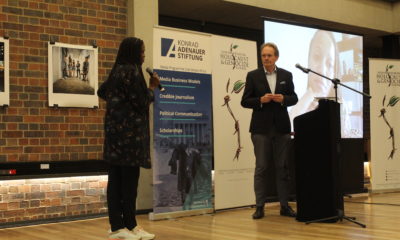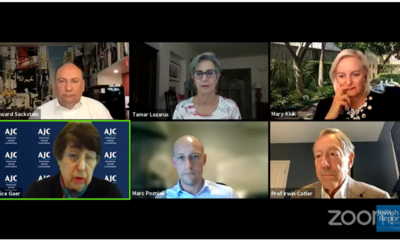
Featured Item
US, Australia, Canada shun anniversary of UN anti-Israel hate-fest
Twenty years ago, the infamous United Nations (UN) World Conference against Racism, Racial Discrimination, Xenophobia and Related Intolerance (or the Durban Conference) descended into a hate-fest against Jews and Israel.
Now, as the UN prepares to mark the 20th anniversary this year, the United States (US), Australia, and Canadian governments all announced that they would boycott commemorative events because of the antisemitic essence of the original conference and its legacy.
“The United States will not attend or participate in any events commemorating the 20th anniversary of the Durban Declaration and Programme of Action or the World Conference on Racism which preceded it,” a spokesperson for the US State Department told The Jerusalem Post on Monday, 3 May 2021.
He said that the US remained “deeply committed to combating antisemitism at home and abroad. Furthermore, the United States stands with Israel and has always shared its concerns about the Durban process’s anti-Israel sentiment, use as a forum for antisemitism, and freedom of expression issues.”
“We won’t associate Australia with one-sided and contentious language that singles out Israel or an event that champions such language,” said Australian Prime Minister Scott Morrison.
“Canada opposes initiatives at the United Nations and in other multilateral forums that unfairly single out and target Israel for criticism,” said Global Affairs Canada spokesperson Grantly Franklin. “Canada is concerned that the Durban process has and continues to be used to push for anti-Israel sentiment and as a forum for antisemitism.”
Reflecting on the significance of the event 20 years ago, Milton Shain, antisemitism expert and emeritus professor of history at the University of Cape Town, says, “The Durban Conference turned into an extension of the Arab-Israeli conflict. It was used as a means of inserting wording into draft resolutions portraying Israel and Zionism as racist, and minimising Jewish suffering and antisemitism. Jewish representatives at the conference were the targets of threatening taunts, and a Syrian delegate openly described the Holocaust as ‘a Jewish lie’ while Israel was portrayed as the world’s ‘central locus of evil’.
“Significantly, it wasn’t only Jews who were outraged at the turn of events. In response to one of the cartoons distributed by the Arab Lawyers Union, UN Human Rights Commissioner Mary Robinson stated, ‘When I see something like this, I’m a Jew’. Prominent African National Congress leader Pallo Jordan also found the disruptions ‘disgraceful’, while South Africa’s deputy minister of foreign affairs, Aziz Pahad, lamented some months later that the conference ‘was hijacked and used by some with an anti-Israel agenda to turn it into an antisemitic event’.”
Michael Kransdorff, an office bearer at the South African Zionist Federation says, “The 2001 conference is a major blight on the UN’s very poor record towards Israel and Jews. I remember, as a student delegate [then national treasurer of the South African Union of Jewish Students], being shocked to see for the first time the notorious antisemitic forgery, the Protocols of the Elders of Zion, being sold outside the venue. Inside, posters with antisemitic cartoons straight out of Nazi propaganda pamphlets were ubiquitous.
“And in the conference discussions and declarations, only the Jewish state was singled out as racist, while some of the world’s worst-affected victims of racial discrimination were in attendance and blatantly ignored,” he says.
“Durban was the start of the major campaign for the legitimisation of the new antisemitism: the conflagration of anti-Zionism and traditional anti-Jewish hatred,” says Kransdorff. “However, we – a handful of Jewish students and international Jewish leaders at the time – wouldn’t be silenced and fought back by exposing the conference for the anti-Jewish hate-fest it was. In disgust, most democratic nations [sadly not South Africa] pulled out, rendering the conference a major failure.”
Sara Gon, the head of strategic engagement at the Institute of Race Relations, says this isn’t the first time these countries have boycotted this event. As well as walking out of the conference in 2001, the US didn’t participate in Durban II in 2009, nor Durban III in 2011, because of virulent antisemitism.
“The Biden administration’s decision to continue boycotting the 20th anniversary ‘event’ in New York in September is a positive response,” says Gon. “This is particularly so given pressure from those with strong anti-Israel positions in the Democratic Party. The US continues to recognise that the original event was a stain on all those who continued with it and didn’t do enough to shut it down.
“The US wasn’t alone in boycotting these meetings,” she says. “Australia, Canada, the Czech Republic, Germany, Israel, Italy, the Netherlands, New Zealand, and Poland stayed away in both 2009 and 2011. Austria, Britain, Bulgaria, and France boycotted the 2011 event.
“Canada and Australia have been staunch allies to Israel, so their response is gratifying and reassuring,” she says. “Neither gratifying nor assuring is the fact that it doesn’t appear that European countries intend to boycott the event. Currently the lack of response is concerning.”
Says local political analyst Ralph Mathekga, “The conference might not focus much on Israel. I think those who are trying to have a dialogue on racism will want to focus on the issues without allowing the conference to descend into an anti-Israel forum. A lot has changed in the past 20 years, and yet not much progress was made regarding racism. The upcoming conference will also be held under COVID-19 conditions – this might ‘mute’ it to some degree.”
“The irony of Durban 2001 was that a conference designed to address hate and racism, itself heralded a hateful agenda of antisemitism,” says South African Jewish Board of Deputies National Director Wendy Kahn. “The conference will always be remembered for its antisemitic displays and protests. It gave legs to the hideous ‘Israel apartheid’ analogy, and spawned the infamous Boycott, Divestment, Sanctions groups that have spewed their antisemitic venom internationally ever since.
“This toxic event continued its vitriol at the follow-up conference in 2009, which I attended in Geneva,” she recalls. “I remember seeing the despot, [Mahmoud] Ahmadinejad, being welcomed into the halls of the United Nations Human Rights Council. To even consider holding yet another hate-fest is a disgrace. I applaud the governments that have taken a principled stance to withdraw from these disgraceful displays of Jew hatred.”










